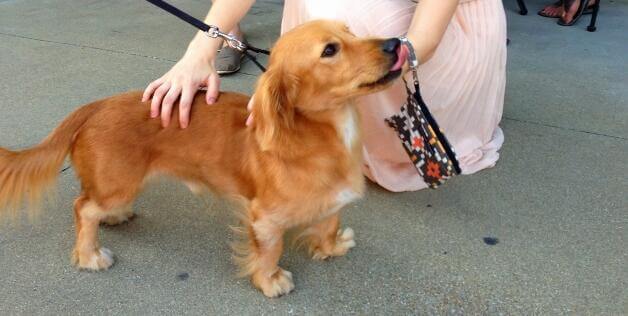
If you’ve ever seen this sweet dog and wondered what it was really like to have one, here’s your go-to guide on everything that you need to know about it, and then some.
The Golden Retriever Dachshund mix is a cross between the named parent breeds. It’s most often referred to as a Golden Dox.
Coat color and size vary depending on the genetics of each parent breed. Their coats typically are dark or light golden. They measure 10-23 inches (25 to 58 cm) in height and most often weigh anywhere between 30-60 pounds (13 to 27 kg).
These are friendly dogs that are great for apartment living. They can be prone to some health and upkeep issues, though.
What is a Golden Retriever Dachshund mix called?
The mash-up name for this mix breed is most commonly the Golden Dox, but it does also go by Golden Dachshund or Golden Weenie. Sometimes the best thing about a mixed breed is its name, right? Exactly.
What does a Golden Retriever Dachshund mix look like?
As you can probably imagine, it really depends on how much of each parent’s genetics are going to be in your puppy.
The most common shade is either a light or dark golden, as mentioned. However, some puppies end up to be:
- Tan
- Black with classic dachshund marketings
- Brown
- Red
- Yellow
The fur type itself also really depends on genetics. Some has short hair, and others had medium or even long hair. The longer it is, the more care it’ll need! But, more on that a bit later. The fur can be smooth or wavy. It may be silky soft or a little wirey.
Most Golden Dox puppies will have a long body from its Dachshund parent and short little legs, too. Some do have longer legs, though. They have floppy ears that come from either/both parents.
The main feature from their Golden parent in most puppies is the muscular build instead of the more graceful and slim build of the classic Dachshund.
How big will a Golden Retriever Dachshund mix get?
In most cases, most puppies will be 10-23 inches (25 to 58 cm) in height. This will be taller if they have longer legs and shorter if they inherit more of their Dachshund genes.
Their weight varies much more dramatically. They can weigh anywhere between 30-60 pounds (13 to 27 kg). The more muscular they are, the heavier they can be since muscle weighs more. And, of course, their height will also factor into their weight.
This size makes these dogs great for small houses or apartments. While they do have exercise requirements (more on that later on), they physically fit better in those smaller spaces than larger dog breeds!
You can find mini dachshunds crossed with a Golden, which would make for an even smaller dog. There isn’t a lot of data on the size, weight, or even the health profile of these dogs. If you want to consider this kind of a mix, you’ll need to find a specialist breeder!
What is the life span of a Golden Retriever Dachshund mix
Since they tend to be smaller dogs, you can expect the lifespan of a Golden Weenie to be between 10-14 years. Most of their lives will be healthy and happy, but they will be prone to some health conditions. These will get more likely as they age, too.
What’s the temperament of a Golden Retriever Dachshund mix?
These are a popular mixed breed because both of their parent breeds are lovely dogs as far as temperament is concerned!
They are friendly, affectionate, and loving. They enjoy being around people of all kinds and will always do whatever they can to be best friends with basically everyone. This means lots of cuddle time on the couch and patience with kids who want to be giving them hugs every few minutes.
They also enjoy other pets for the most part, though they don’t tend to enjoy being around small animals such as rabbits or hamsters (more on that in a bit).
A Golden Weiner loves to be outdoors. Whether playing in the backyard or on a hike with the family, they just love being out in the elements as much as possible. This is great for getting them to walk or play fetch and more.
Don’t worry, though. They’re just as content to laze on the couch as you are. What it comes down to is that your pup is going to enjoy being outdoors and exploring — but only if their favorite human is by their side!
These dogs love to play with toys and can be prone to chewing and biting a lot because of it. They are very loyal, so you’ll be relieved to know that your Golden Dox will hang around you a lot. Even at a dog park, it’s common for these human-loving dogs to circle back and check in with you before running off to play with their new friends again.
One of the best traits uncommon with many smaller dogs is that they won’t be barking their head off every 5 minutes. They will typically only bark if they are trying to get your attention in that something is wrong. Of course, they will need to be trained on what to pay attention to and what to ignore.
Since these dogs are so friendly, you’d probably not want to depend on these dogs as guard dogs! Since they want to be everyone’s bestie, they will probably just welcome a stranger right into your home rather than offer any kind of protection.

Are Golden Weiners good family dogs?
Yes, definitely! These dogs are great additions to the family. They tend to act like classic Golden Retrievers in terms of their overall attitudes and temperament, so these will be great additions.
They are playful, enjoy being around their humans — especially the mini ones — as much as possible, and get along with most family pets.
As mentioned above, however, these dogs aren’t great with small animals. Because of their Dachshund genetics, they can be prone to a strong prey drive. When you have small animals such as rabbits, hamsters, or even cats, it can activate that prey drive and cause them to chase them out of literal instinct frantically.
If you have caged animals, you’ll need to prioritize socialization and watch those instincts coming out. They should never be left alone together unsupervised.
Golden Dox health issues
There are quite a few health issues that can follow this mixed breed. These come from both parentages, so you’ll want to have a vet that is experienced with both of them, if possible.
Some of the common problems include:
- Ear infections
- Cushing’s Disease
- Eye problems
- Back issues (Weiner)
- Allergies
- Bloat
- Obesity
Ear infections
Because they have large and floppy ears, many Golden Weiners will have ear problems. You’ll most likely have lat east once or twice when you need to deal with it. Proper care can help with this, of course. We’ll get into that a little later.
Cushing’s Disease
This is a common and serious health condition that can be life-threatening if left untreated. It happens when a dog overproduces cortisol. It can impact their kidneys cause heart problems, and even onset of diabetes.
This can be managed with medication, but you’ll need to make sure that you watch for symptoms. Your vet will be able to tell you more information on this, too.
Eye problems
As they age, cataracts (coloring of the lens on the eye) are prevalent in both breeds. You’ll want to look at eye drops to help or surgery to correct the problem correctly. This can lead to partial or complete blindness if it progresses.
Back issues
Since these inherit the Dachshund shape, you’ll also find that they can have spinal issues. Since their spines are so long compared to the rest of their body, you’ll need to limit their exercise and be careful with jumping and hopping, both of which can stress their spines.
A vet can help you prevent spinal issues in proper care, but they tend to show up once they are senior dogs.
Allergies
Common in many dogs, allergies can be severe and lifelong. If you suspect your Golden Weiner has an allergy, you’ll want to look at having him tested so that you can know what food or shampoos (or both!) to avoid so that he can stay healthy. Even the best breeder can’t prevent allergies, so keep this in mind!
Bloat
Bloat in dogs is always serious and can be fatal. Bloat causes the stomach to twist, and gases will build up in the segmented part of the stomach. They will swell the gut, blood flow will be compromised to the heart, and breathing can be difficult. Bloat can happen to any dog at any age, so make sure that you know the symptoms.
Obesity
While these are active dogs by nature, obesity can be common in both parent breeds. This is best prevented by proper diet and care, of course, including regular exercise.
Your vet can often recommend ways to help prevent obesity from sitting in. Since obesity can sometimes worsen the risk of other conditions, including spinal issues, this is one that you’re going to want to avoid!
How to take care of a Golden Dox
You’ll be happy to learn that properly caring for your sweet dog isn’t going to be a chore. It just comes down to focusing on some of the essential parts of daily care. They are listed below for you.
Daily care
This starts with a proper, nutritious diet. If you aren’t sure what food to give your dog, ask your breeder or your vet. Also, invest in healthy treats. Make sure that your Golden Dox gets an hour or more of exercise each day, too, which will keep them happy and healthy.
You will also need to get used to grooming them daily. If they have short or medium fur, you might be able to get away with it every other day. But, daily grooming is great for keeping their coats glossy, healthy, and helps you bond with your dog, too!
Weekly or biweekly care
Weekly, you’ll need to check their ears and clean them out gently to help eliminate any bacteria. This is also going to double as check for infections. The cleaner that you keep their ears, the easier it’ll be to avoid the infections, too!
You’ll also need to brush their teeth 2-3 times a week. The more you do this, the better their dental hygiene will be (vital for nutrition). As well, the more that you do it, the more that they’ll get used to you, and they won’t fight you as much!
Monthly or bi-monthly care
At least once a month, you’ll want to clip their nails. This is no one’s idea of a fun time, but it’s important to do! If you absolutely can’t stand doing it yourself, you’ll want to bring your Golden Dachshund into the groomer to be done once a month.
Speaking of groomers, you’ll also want to have them professionally bathed every month or every other month. Even if you brush them daily, this is good for their skin’s health and their fur’s health. If you are careful, you can even get the timing to work out with their nail clipping, too!

How much is a Golden Dachshund to buy?
These are beloved family dogs, and there are quite a few breeders that will offer them. This means that prices can be relatively flexible and will often be between $500-$1000 as far as reasonable range.
If your Golden Weiner has unique markings or colors, it may cost more than that! Rescue organizations can offer you a smaller price tag, but it comes with the trade-off of not knowing their genetics or history, of course.
Pros and cons of a Golden Retriever Dachshund mix
There are a lot of pros to these sweet dogs, to be sure. However, there are some potential cons to keep in mind, as well!
Here they both are in black and white to help you make the right decision for your family.
PROS
- Friendly
- Love people
- Great for small spaces
CONS
- Stubborn
- Not good around small animals
- Can be chewers
Pro points of a Golden Dox
These really are going to be amongst some of the friendliest dogs that you’ll find. Whether you are a single dog parent-to-be looking for companionship or a busy parent of 4 humans children, this dog will fit in just right and be loved by everyone.
They are intelligent and loyal and will be great choices for those who want a breed that will mostly listen to their commands and training. They are trustworthy about children and most other pets, too. They basically just fit right in!
They love to walk and explore, generally hang out with the family, and do whatever everyone else is doing with no complaints. From an apartment to a house with a backyard, most dogs will fit in comfortably to either or both situations, making it just right for anyone and everyone, regardless of their situation.
Con consderations for a Golden Weiner
Pros aside, there are some important reminders for adding one of these Goldens to your life!
Even though they are pretty good with obedience training, these are stubborn dogs. So, they may kick up a fit if or when they don’t want to listen to the command that you’re telling them to. You’ll need to be firm and consistent with their training so that they know to, in fact, listen to you.
As mentioned above, their strong prey drive can potentially make a bad match with households that have small pets. This is especially so if those small pets are free-roaming a lot. You will always need to supervise their time together or be ready to keep them apart when the caged animals are let out.
If you are a lover of hamsters, guinea pigs, and even cats, this is something to seriously consider since it’s hard to think about after the fact.
Lastly, these dogs can be prone to chewiness. You’ll probably want to prioritize those toys with no stuffing and get used to replacing their toys regularly since they’ll chew a lot of toys in a short time.
In review
A mix between a Golden Retriever and a Dachshund, a Golden Dox tends to be between 10-23 inches (25 to 58 cm) in height and weigh anywhere between 30-60 pounds (13 to 27 kg), primarily dependent on genetics.
They are commonly golden in color and may or may not have dachshund markings. These are great family dogs and are comfortable with apartment living.
Prone to some health conditions, especially as they age, proper care on ad daily, weekly and monthly basis is really important.
As far as family-friendly dogs, a Golden Dox is an excellent choice in most situations. While you will need to be ready to deal with some health concerns as they age, they are great options for a loving, affectionate, active family dog!
